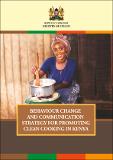| dc.description.abstract | An estimated 2.5 billion people worldwide use biomass fuels, such as firewood and charcoal, as
the primary source of cooking. The fuels release emissions of carbon dioxide, methane and black
carbon – some of the biggest contributors to global climate change. The aim of this Behaviour
Change Communication (BCC) strategy is to increase awareness of the benefits of clean cooking
and encourage the uptake of improved cooking solutions.
The rallying call of this BCC campaign is “Upishi Bora, Afya Bora.” The messages focus
on the benefits of using improved cooking solutions, such as saving money and time, improving
health, and positive environmental impacts. The primary audience of these messages is women
living in rural, peri-urban, and informal settlements of Kenya. Secondary audiences are men,
community networks, and private sector players, among others.
Seven strategies were identified: (1) Ideation, branding and rallying call, (2) Execution of an
awareness and behaviour change strategy, (3) Focus on elements of behaviour change, (4) Media
advocacy to enhance public awareness and understanding of clean cooking, (5) Partnerships and
coalitions, (6) Special events to promote clean cooking, and (7) Engaging the private sector/
industry players in promoting clean cooking.
Both above-the-line (ATL) and below-the-line (BTL) tactics will be employed. ATL tactics,
such as media advertising, broadcast SMSs, social media adverts, and promotional t-shirts, lessons,
and umbrellas will be used while BTL will leverage on existing networks of Community Health
Volunteers (CHVs), Community Forest Associations (CFAs), Agricultural Extension Officers
(AEOs), Water Users Associations (WUAs) and women’s groups. The strategy finally outlines
both the implementation and coordination as well as the monitoring and evaluation framework. | en |

